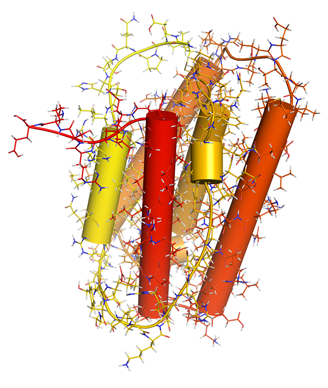Interferon Could Help CML Patients Stop TKI Therapy
Results from a small study suggest that treatment with interferon alpha 2a could help chronic myeloid leukemia patients discontinue imatinib treatment.
Interferon alpha 2a molecule. Image © molekuul.be / Shutterstock.com

Results from a small study suggest that induction treatment with interferon alpha 2a (IFN) along with imatinib, followed by temporary IFN maintenance therapy, could help patients with chronic myeloid leukemia (CML) discontinue imatinib treatment.
“After prolonged imatinib therapy, approximately 40% of all chronic phase CML patients eventually achieve a stable deep molecular remission of MR4.5,” wrote study authors led by Andreas Hochhaus, MD, of Universitätsklinikum Jena in Germany. Most imatinib patients will not achieve that remission, however, if therapy is withdrawn too early. “Strategies to improve the proportion of CML patients who can successfully discontinue imatinib are currently unknown.”
In this study, 20 chronic phase CML patients were treated upfront with IFN alpha plus imatinib, followed by IFN monotherapy after imatinib discontinuation. The results were published in Leukemia.
The median duration of the combination was 2.4 years; 11 patients discontinued imatinib in major molecular remission (MMR), and 6 discontinued in MR4/MR4.5. After a median follow-up period of 7.9 years, the relapse-free survival rate in those two groups was 73% and 84%, respectively. The overall relapse-free survival rate for the full 20-patient cohort was 65%.
Ten patients then discontinued IFN therapy after a median of 4.5 years. A median of 2.8 years after that discontinuation, 9 of those 10 patients remain in ongoing treatment-free remission. Four other patients still receiving IFN are in stable MR5, MR4.5, MR4, and MMR, respectively.
The overall cohort had a survival rate of 85% after a median interval of 11.1 years from the time of initial diagnosis. All three patients who died had non-CML-related causes of death. The authors noted that the patients who did not relapse had a significantly deeper MR level at baseline than those who did relapse (P < .001).
Several trials have looked into CML patients’ ability to maintain remission following discontinuation of tyrosine kinase inhibitor (TKI) therapy. In this trial, the authors noted that patients did not have as long a history of imatinib therapy but still maintained remission in a high percentage of cases. “In other words, although none of our patients met the inclusion criteria of published TKI discontinuation trials, most of them successfully discontinued imatinib and later on also IFN,” they wrote.
The observed apparent synergism between imatinib and IFN, they suggested, could be a result of imatinib “converting” CML patients into responders to IFN by fostering a major molecular response.
“Owing to the uncontrolled nature of the study and a relatively small patient number, the favorable outcome in our cohort could have resulted in part from patient selection bias,” the authors cautioned. Still, this concept has potential as a method to help more CML patients discontinue treatment, and it is being studied in a phase III randomized trial in Germany.